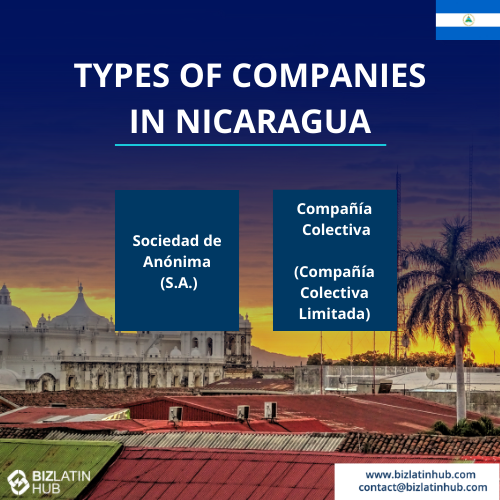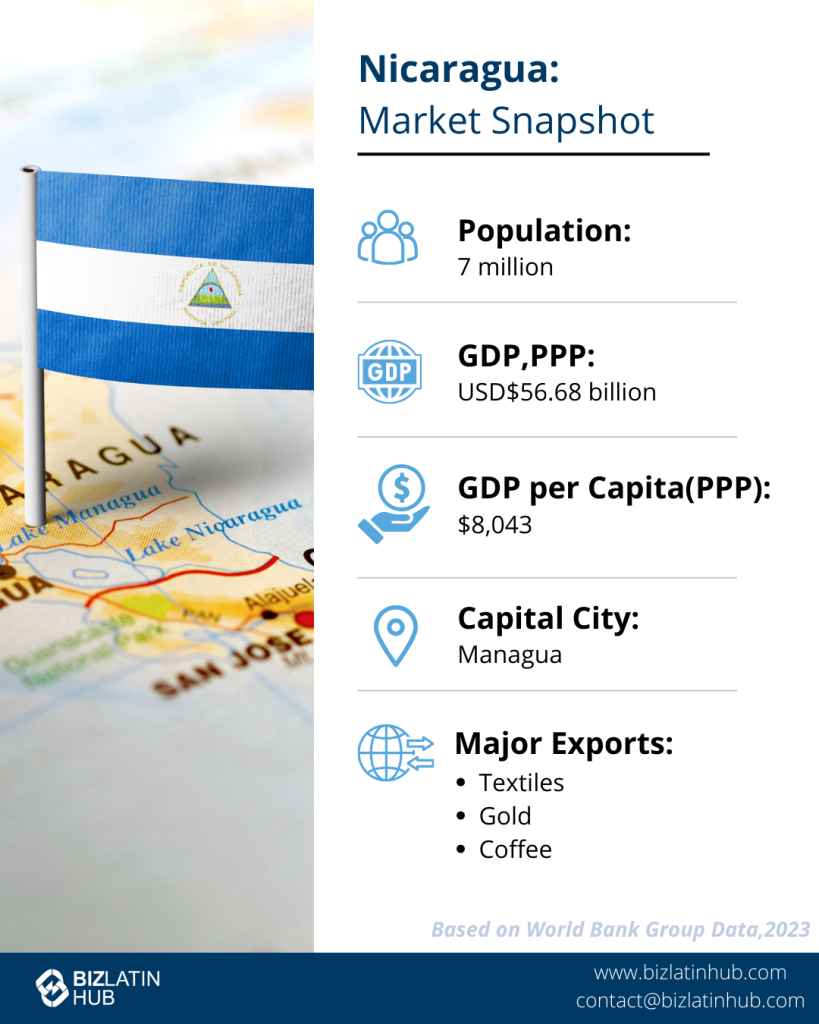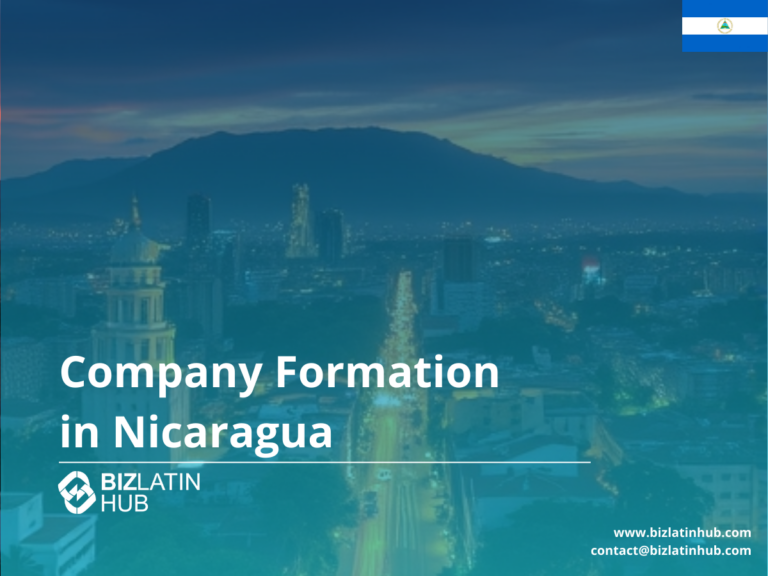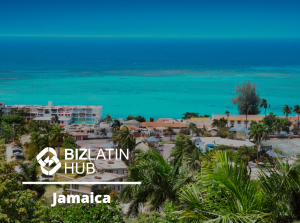To form a company in Nicaragua provides access to a growing economy, a strategic Central American location, and a supportive business environment. With steady economic growth, government incentives, and a rising middle class, the country offers significant opportunities in sectors like tourism and manufacturing. At Biz Latin Hub, we specialize in company formation in Nicaragua, ensuring a smooth and efficient incorporation process. This guide outlines the specific legal steps required to incorporate a Sociedad Anónima (S.A.), the most common vehicle for foreign investment.
Key Takeaways On How To Form a Company in Nicaragua
| Is Foreign Ownership Permitted? | There is no restriction on foreign ownership of businesses in Nicaragua. |
| Steps for Company Formation in Nicaragua: | Step 1 – Draft Act of Incorporation. Step 2 – Buy Accounting and Corporate Books. Step 3 – Submit Act of Incorporation at VUI. Step 4 – Register as a Trader and Register Accounting Books. Step 5 – Obtain the Single Registration Document. Step 6 – Legal Representation. |
| What are the main entity types in Nicaragua? | Corporation (Sociedad Anónima (S.A.) Limited Liability Company (Sociedad de Responsabilidad Limitada S.R.L.) |
| Why Choose Company Formation in Nicaragua? | Nicaragua boasts a favorable investment climate with competitive labor costs, tax incentives, and free trade agreements that provide access to key international markets. |
| What obligations come with company formation in Nicaragua? | Registration with the Public Mercantile Registry is mandatory. All companies must obtain a Tax ID (RUC) from the DGI. |
How does company formation in Nicaragua work?
To set up a company in Nicaragua you must follow these 6 steps:
- Step 1 – Draft Act of Incorporation.
- Step 2 – Buy Accounting and Corporate Books.
- Step 3 – Submit Act of Incorporation at VUI.
- Step 4 – Register as a Trader and Register Accounting Books.
- Step 5 – Obtain the Single Registration Document.
- Step 6 – Legal Representation.
Step 1: Draft Act of Incorporation:
The drafting of an Act of Incorporation requires at least two shareholders, either individuals or corporations and a minimum start-up capital of C$10,000 (approximately US$400). A legal representative with a Nicaraguan residency must be appointed. Additionally, the final act must be authorized and certified by a Nicaraguan public notary.
Expert Tip: Defining the Corporate Purpose
From our experience, the “Corporate Purpose” clause in the Act of Incorporation is critical. If it is too narrow, you may face difficulties later if you want to expand your business activities or import certain goods. We advise clients to draft a broad corporate purpose that covers not only their current intended activities but also potential future operations, commercial representation, and import/export capabilities.
Step 2: Buy Accounting and Corporate Books:
These books are required for the registration of a company and may be acquired at local bookstores.
Step 3: Submit Act of Incorporation at VUI:
These documents are received at the Ventanilla Unica de Inversiones (Investment Service) and processed by the Commercial Registry. They require a payment of 1% of the company’s capital but up to a maximum of C$30,000 (approximately USD$1,200).
Step 4: Register as a Trader and Register Accounting Books:
Once the act of incorporation has been processed, one must register as a trader and also register the accounting books with the Commercial Registry. This procedure is also done at the VUI.
Step 5: Obtain the Single Registration Document:
This procedure may be done simultaneously with the previous one. This document is completed and submitted at the VUI and through it the investor receives the Municipal License, the License of the Nicaraguan Social Security Institute (INSS, for its acronym in Spanish), and the Tax Payer Registration (RUC, for its acronym in Spanish) of the General Revenue Department. The DUR requires a payment of 1% of the company’s capital.
Step 6: Legal Representation
For a corporation, shareholders must appoint a legal representative, who must be a Nicaraguan Resident or Citizen residing in the country. Choosing a trusted individual is crucial. The representative’s powers may be limited by the Board of Directors as deemed reasonable.
What are Common Entity Types in Nicaragua?
In Nicaragua, the two main types of companies commonly used for business incorporation are:

- Sociedad Anónima (S.A.) – Corporation:
This is a common structure for medium and large businesses, offering limited liability protection to shareholders. The S.A. requires at least two shareholders and a minimum capital contribution to register. It is ideal for businesses seeking to raise capital or operate on a larger scale. - Sociedad de Responsabilidad Limitada (SRL) – Limited Liability Company:
The SRL is suitable for small to medium-sized enterprises and provides limited liability to its partners. It requires a minimum of two and a maximum of 30 partners. The SRL is generally simpler to manage and has fewer compliance obligations than a corporation.
Both structures offer limited liability, ensuring that personal assets are separate from business obligations, making them attractive for investors.
Why is company formation in Nicaragua a good idea?
Nicaragua is a country that is looking to the future. It’s true that the country lags behind its neighbors on a number of economic indicators, but that is simply a sign of the wealth that awaits early adopters. After all, it has no fewer natural resources.
The country is ideal for nearshoring as company formation in Nicaragua means easy logistical connection to North America, South America and Asia. With wages remaining competitive as well, it’s clear to see the potential available in the country.

The Single Window for Investment (VUI)
Nicaragua has implemented a Single Window for Investment (Ventanilla Única de Inversiones – VUI) to streamline the process. This system allows investors to complete several registration steps with different government agencies in one location, significantly reducing setup time.
FAQs on company formation in Nicaragua
According to our experience, these are the most common questions and doubts of our clients when considering company formation in Nicaragua.
1. Can a foreigner have a business in Nicaragua?
Yes, foreigners can own and operate businesses in Nicaragua. There are no restrictions on foreign ownership of businesses in Nicaragua.
2. What is the Nicaragua Company Tax ID?
In Nicaragua, for companies and individuals engaging in commercial activities, it is mandatory to register in the Single Registry of Taxpayers and acquire a Taxpayer Identification Number, commonly referred to as RUC (registro único de contribuyente) in Spanish. This is important for the process of opening a bank account in Nicaragua.
3. How long does it take to register a company in Nicaragua?
The process of incorporating a company in Nicaragua, once the Articles of Incorporation and By-laws have been finalized and signed, typically takes 4 to 6 weeks. After this process, you can begin carrying out the various activities for which you established the company and apply for any applicable incentives.
4. What does “S.A.” mean in Nicaragua?
In Nicaragua, S.A. stands for Sociedad Anónima, which tis similar to an LLC. This legal structure separates the company from its shareholders, each of whom owns shares representing their ownership stake. The financial liability of shareholders is limited to the value of their shares.
5. What does “Compañía Colectiva” mean in Nicaragua?
This is is a partnership where there must be a minimum of 2 natural persons as partners. The business name of the Compañía Colectiva is a listing of the names of all the partners or some of them, with the addition of the words y Compañía. This legal entity offers limited liability to its shareholders, similar to S.A. companies, as long as the word limitada is added to the business name.
6. What types of entities offer Limited Liability in Nicaragua?
In Nicaragua, both S.A. (Sociedad Anónima) and Compañía Colectiva (Compañía Colectiva Limitada) are legal entity types that offer limited liability to their shareholders.
7. Is there a minimum capital requirement?
The minimum capital for an S.A. is NIO10,000 (Córdobas), but it does not necessarily need to be fully paid into a bank account at the moment of incorporation; it must be subscribed.
8. What books must be legalized?
Companies must legalize four books: the Journal, the General Ledger, the Minutes Book, and the Shareholder Register.
What are the Key differences between SA and CCL in Nicaragua?
| CCL | SA | |
|---|---|---|
| Shareholders | Minimum of two shareholders; single-member companies are not allowed in Nicaragua. | |
| Management | Managed by one or more partners. | Requires the election of a board of directors from among the shareholders. |
| Liability | Liable only up to the monetary value of their contributions. | Liable only up to the value of their shares. |
| Company Size | Suitable for smaller companies; partners’ identities are disclosed. | Preferable for larger companies to safeguard shareholder and director anonymity. |
| Regulatory Requirements | Closely tied to the collective partners. | More impersonal, often favoring management. |
Why Choose to Incorporate a Company in Nicaragua?
Incorporating a company in Nicaragua offers businesses access to a growing economy with a wealth of opportunities in agriculture, manufacturing, tourism, and renewable energy. Nicaragua boasts a favorable investment climate with competitive labor costs, tax incentives, and free trade agreements that provide access to key international markets. Its strategic location in Central America serves as a gateway to both North and South America, making it an ideal base for regional operations. Additionally, the Nicaraguan government actively encourages foreign investment through its pro-business policies and streamlined incorporation processes.
The country’s infrastructure is steadily improving, with ongoing investments in transportation, energy, and telecommunications that support business development. Nicaragua also enjoys a youthful and skilled workforce, ensuring access to capable talent for businesses across various industries. By choosing to incorporate a company in Nicaragua, investors can leverage these advantages to establish a strong foothold in a promising and expanding market. Whether you are a small business owner or a multinational enterprise, Nicaragua offers a dynamic environment for growth and profitability.
Biz Latin Hub can help with company formation in Nicaragua
At Biz Latin Hub, we offer a comprehensive range of market entry and back-office solutions in Latin America and the Caribbean.
We have expertise in company formation/incorporation in Nicaragua, with legal services, accounting and taxation, hiring, and visa processing available.
We retain a large presence in LATAM with strong partnerships throughout the region. This far-reaching network gives us lots of tools to help with international projects and entering new markets in different countries.
Contact us today to learn more about our services and how we can help you achieve your business goals in Latin America and the Caribbean.







